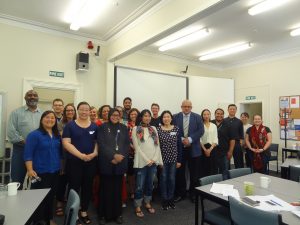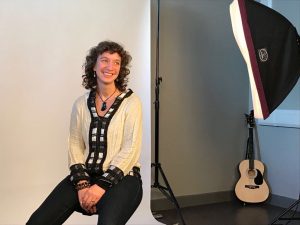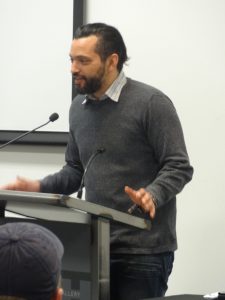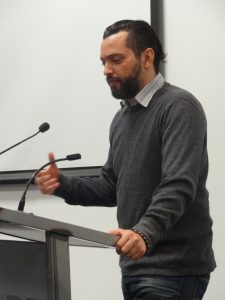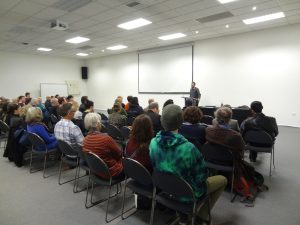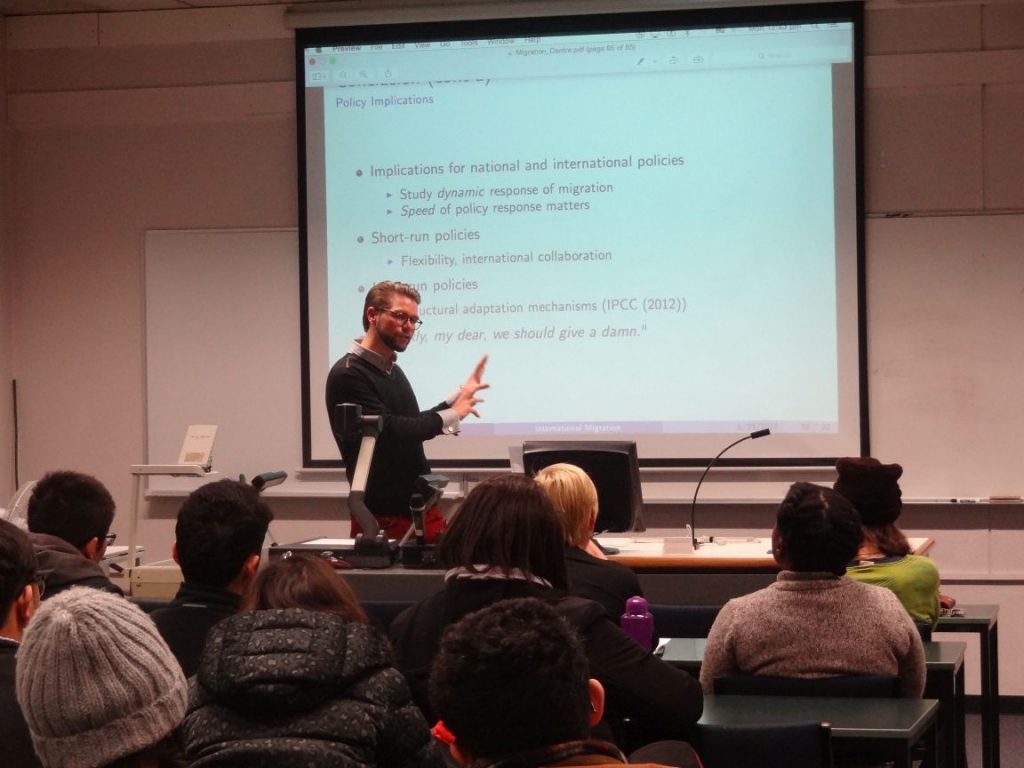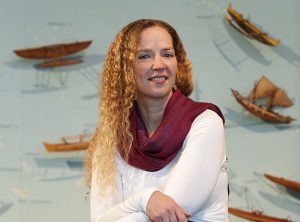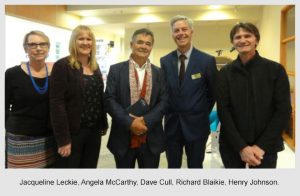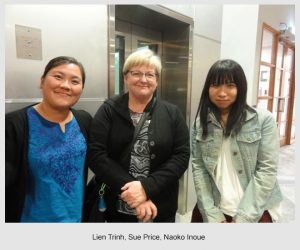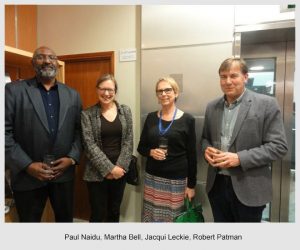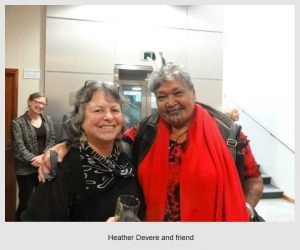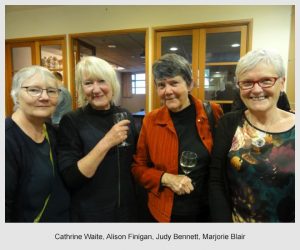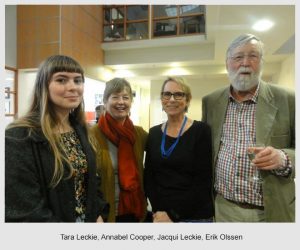Education, Migration and Translation Symposium
On Sunday 26 November 2017, we held a one-day symposium on education, migration and translation, organised by Professor Henry Johnson and Dr Vivienne Anderson. The keynote speaker was Professor Michael Singh from the Centre for Educational Research, Western Sydney University. A further 13 presentations followed, leading to rich and stimulating conversations.
One of our presenters, Sherrie Lee from the University of Waikato, featured the symposium on her blogsite, ‘The Diasporic Academic’. Presenting five papers at four events over three weeks, we were delighted that Sherrie awarded us her prize for ‘Best Intellectual Engagement’. Sherrie wrote of the event:
‘The one-day multi-disciplinary symposium was varied in its presentations ranging from the classroom, to community, to larger ideological issues operating in diasporic and multiethnic spaces. Despite the wide-ranging topics, I enjoyed and learnt from the high quality presentations, not least the keynote presentation by Professor Michael Singh who demonstrated strong theoretical and historical links among the three big themes of education, migration and translation.
‘This one day symposium was truly an unforgettable experience where we spent most of that Sunday in one seminar room, not only sampling a large array of research, but having rich conversations with one another.’
Dunedin also won Sherrie’s prize for Best conference city. As she noted, ‘The lovely weather sustained throughout the five days I was there was simply unbeatable.’
Public Lecture: Refugee Stories in Scotland – Prof Alison Phipps
Free Public Lecture
‘Refugee Stories in Scotland’
Professor Alison Phipps, University of Glasgow
Wednesday 6 December 2017, 12.30-1.30pm
Dunedin Public Art Gallery, The Octagon, Dunedin
Next month, we are delighted to host Professor Alison Phipps, the UNESCO Chair in Refugee Integration through Languages and the Arts at the University of Glasgow. A regular public speaker and media commentator on refugee issues, Professor Phipps will speak on her work with refugees in Scotland.
Summary of Talk
At times of great human suffering, we see extraordinary courage and compassion. Communities across Scotland, and Europe, have led with creativity, practical action and costly generosity in Calais, Lesvos and in receiving communities in Scotland. The people have led where larger institutions and some governments have been slow, reluctant and mired in outdated thinking and ineffective solutions.
At the same time, we have witnessed a vicious rise in xenophobia and structural violence against refugees. This has happened in Europe before and we have much to learn from the lessons of history. The last time Europe faced such numbers of refugees it failed. Facing its failure the articles protecting Human Rights were created and these very articles are now in peril. The last time the people of Europe said never again.
This public lecture will focus on the responses of civil society and policy makers in Scotland, within an uneasy UK, and at the time of BREXIT, and on the stories of day to life as people integrate into communities in Scotland.
Speaker Biography
Professor Alison Phipps, OBE, is UNESCO Chair in Refugee Integration through Languages and the Arts at the University of Glasgow and Professor of Languages and Intercultural Studies. She is co-convenor of the Glasgow Refugee, Asylum and Migration Network (GRAMNET). In 2012 she received an OBE for Services to Education and Intercultural and Interreligious Relations in the Queen’s Birthday Honours. She is a Fellow of the Royal Society of Edinburgh, the Royal Society of Arts, and of the Academy of Social Sciences.
The author of numerous books and articles and a published poet, Professor Phipps has undertaken academic and artistic work in a range of countries and regularly advises public, governmental and third sector bodies on migration and arts and language policy. She participated recently in a witness-bearing visit to Calais for Scottish Members of the Home Affairs Select Committee.
Programme for Education, Migration and Translation Symposium
We are very happy to announce our programme for the one-day Education, Migration and Translation symposium taking place Sunday 26 November 2017. The programme can be downloaded here: 2017 education event (47KB).
Further information is available on the conference website. Registration can be made here.
Muslims ‘Belonging’ to Muslims ‘Becoming’ Public Talk
On 29 June 2017, Dr Yassir Morsi, politics lecturer from La Trobe University and the Centre’s 2017 Visiting Scholar, spoke on Muslims, migration, belonging and becoming.
With a nod to his birth in the UK to secular Egyptian parents and his later upbringing in Australia, a migration taken to escape Britain’s racism, Morsi explained his conscious act to ‘become’ more Muslim after 9/11. This ‘flirtation with Islam that was anti-Western’ included attending mosque and using Muslim phrases. But Morsi was left with the lingering problem of where he and other Muslims belong. For years, he has grappled with this issue.
In his talk he pointed to three strategies in which he and other Muslims have sought to belong in ‘white’ Australia. The first of these is what Morsi terms an ‘act of confession’. It encompasses a lack of secrecy, love of democracy and espousal of typical Australian aspects such as love of rugby and speaking with an Australian accent. In other words, Morsi took on the performance role of being Australian.
The second strategy is that of the ‘moderate mask’, in which excessive pleasantries and anger are repressed because of their ability to trigger anxieties. Morsi spoke of allegations that he supported radicalism and blamed Australia for terrorism, simply because he would try to explain the complexity of the world and point to inequalities that mean ‘Australia is not the same place for everyone’. In such an environment, Morsi struggled to find an authentic voice for the book he was writing. He therefore ended up writing about the process of not being able to write.
The third strategy is that of self-policing, involving difficult conversations within the Muslim community and being appropriately critical. Morsi admitted that as a male he has certain privileges denied African Muslim women, even though many females of colour are leading feminist movements. But even within Muslims spaces, Muslims find it hard to have conversations that do not sap their energies or comment on issues such as gender violence within the Muslim community for fear that this enhances racism towards them.
Frequently called upon to explain Muslim practices and ways of thinking, Morsi identified three issues he is continuously asked about: polygamy; homosexuality; and whether he sees himself as progressive or conservative. Not having opinions on these matters has left Morsi and many Muslims being perceived as either moderate or radical with no in-between space to define themselves or be non-political.
Throughout his talk Morsi drew upon several stories from his book Radical Skin, Moderate Masks to convey his journey from belonging to becoming. These include an Australian TV producer approaching him for advice on a forthcoming series in which 10 diverse Muslims are placed for 10 days in a Big Brother environment without the evictions. Morsi also likened Australia to nightclubs with bouncers deciding who belongs and who does not.
Held at the public auditorium of the Dunedin Public Art Gallery, Dr Yassir Morsi’s talk attracted a crowd of around 60 folk and generated a sustained question and answer session.
Gone with the Wind: International Migration seminar
On 29 May 2017, Economics lecturer Dr Dennis Wesselbaum spoke about his recent research examining the drivers of international migration, with a particular focus on the climate. His presentation showcased findings from a rich dataset from 16 destinations (including New Zealand, Australia, the US, UK, Germany and France) and 198 countries of origin between the years 1980 and 2014.
What did the data reveal about the drivers of migration? While acknowledging the effect of factors such as wage differentials, migration cost, and political freedom, Dennis emphasised the importance of climate change, including rising temperatures and weather-related disasters such as heatwaves, droughts, and storms.
With an increase in temperatures since 1980, total weather disasters have tripled, with countries also experiencing more frequent disasters. Increased temperatures not only reduce crop yields but make water and resources scarce and could lead to increased civil unrest. In this context, migration can be understood as an adaptation strategy to climate change.
Further, the study shows that the response of migration over time is very different across varied driving forces. This has important policy implications so far neglected in the policy and public discourse.
A robust discussion followed Dennis’ presentation, including questions about his rational choice model when migration narratives often show ‘messy’ decision making, the importance of cultural networks for migrants, and why, despite a high temperature, so many move to Australia.
‘From Africa to Aotearoa’ seminar
‘From Africa to Aotearoa’ is one of Professor Lisa Matisoo-Smith’s current research projects and on 15 May 2017 the esteemed Professor of Biological Anthropology gave the inaugural Global Migrations seminar on this topic to a packed room.
Noting that her early work had examined the mitochondrial DNA (mtDNA) of rats, dogs and chickens to try to reconstruct Pacific migration pathways, Lisa’s current research on human mtDNA developed after 2008 when indigenous communities she was working with in New Guinea suggested examining their DNA. At the same time, National Geographic also approached Lisa to join their Genographic team studying human genetic diversity. In 2013, with the continued support of National Geographic and a Royal Society of New Zealand James Cook Fellowship, she began the Africa to Aotearoa study, involving random genetic sampling of more than 2,000 Kiwis at markets and some marae in main cities. Additional sampling focused on specific ethnic groups including New Zealand Chinese, Dalmatian and Lebanese communities.
Settled quite late towards the end of the thirteenth or early fourteenth century, New Zealand today has a diverse gene pool emanating from a common African matriarchal ancestor. Examining these DNA relationships highlights the diverse migration journeys of New Zealanders, from those first Maori colonists through to those arriving today.
Lisa’s overall results show that a large proportion of the New Zealand population has mtDNA that is very similar to the British Isles, especially in Dunedin, Christchurch and Wellington, with 40-50% of these populations having mtDNA Haplogroup H, followed by another 30% being made up of Haplogroups J, K, T and U. Auckland and Hamilton, by contrast, have larger Pacific, South Asian, and east Asia lineages with Otara’s sample exhibiting 54 per cent of Maori and Pacific mtDNA (Haplogroup B) genes. By contrast, Parnell’s population contains strong British genetic connections and Glenfield, South African.
Subsequent work from the project includes MBIE Curious Minds funding for teachers to undertake DNA testing and use their results to teach their classes about human evolution and human migration. In 2019, Lisa’s book from the Africa to Aotearoa project will be published, just in time to commemorate the 250th anniversary of Captain Cook’s landing in New Zealand.
Launch of Centre for Global Migrations
The Centre for Global Migrations at the University of Otago held its launch on Wednesday 26 April 2017 at the Hocken Collections. The event also paid tribute to our friend and colleague, Associate Professor Jacqueline Leckie.
Among the distinguished speakers at the event were Dunedin City’s Mayor Dave Cull, the University’s Deputy Vice Chancellor Research and Enterprise, Professor Richard Blaikie, and Professor Judy Bennett from the Department of History and Art History.
In his speech, the Mayor drew attention to Dunedin’s strong Scottish heritage but also emphasised the importance of migrants from around the world who came to the area to seek gold: ‘The result is that cultural and ethnic strands and colours, some broad, some just a thread, have been woven together to make a multi-coloured plaid, a city of Dunedin community tartan … Chinese, French, Lebanese, American, Irish, Poles and European Jews all added their distinctive strands to the district.’
Mr Cull went on to note the ever changing nature of Dunedin’s migrant flow. With the influx of ‘Dutch, British, Germans, Pacifica people, Americans, Indians, Vietnamese, Lao and Cambodians’ and, more recently, Syrian refugees, ‘Dunedin’s cultural tartan … is now a gorgeous, highly chequered plaid’.
In his concluding remarks, the Mayor expressed appreciation at seeing so many representatives of different migrant communities at the launch and congratulated the University ‘for the way it has supported and nurtured this initiative and made Dunedin the home for this global migration research theme’.
Professor Bennett, in her tribute to Associate Professor Jacqueline Leckie, warmly reflected on their enduring friendship over the last three decades. She further emphasised Jacqui’s ‘strong commitment to scholarship and the Pacific. And to migration studies and Indian heritage in the Pacific – not many academics have one of their books launched by the Governor General at a national celebration of Diwali in parliament!’
At the launch were members of the Centre, friends and colleagues at the University, representatives of ethnic and migrant groups, and heritage professionals.
The full text of Mayor Dave Cull’s speech is available here: Mayor Launch Speech (56KB). Some images from the event appear below (click to enlarge).
Call for Papers for Education, Migration and Translation Research Symposium
Sunday 26 November 2017
University of Otago, Dunedin, New Zealand
Call for Papers
Keynote Speaker: Professor Michael Singh (Western Sydney University).
This one-day multidisciplinary research symposium will examine the connections between education, migration and translation.
The organisers welcome proposals for 20-minutes presentations that examine the connections between education, migration and translation. Further details can be found by clicking here: Nov 2017 seminar.
The deadline for abstracts and a short biography (200–250 words) is 30 June 2017.
Abstracts should be submitted in English, or English and another language as appropriate, to henry.johnson@otago.ac.nz.
The conference registration fee is $25 to cover catering. For those not presenting, we will need confirmation of attendance for catering purposes by 31 October.
The symposium will be held immediately before the New Zealand Asian Studies Society conference beginning Monday 27 November.
Welcome
Welcome to the blogsite of the Centre for Global Migrations at the University of Otago.

